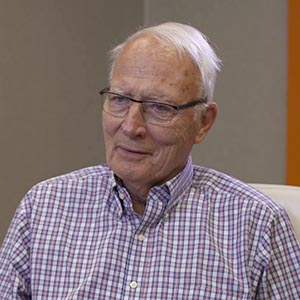US Senator David Durenberger reflects on the 30th anniversary of the ADA
The Minnesota Governor's Council on Developmental Disabilities has archived historical videos and documents since the 1990s. The latest interview features former US Senator David Durenberger reflecting on the 30th anniversary of the ADA.
He began his Senate career by addressing women's discrimination and then disability discrimination; how people with disabilities became his friends and influencers; how the ADA passed; and the impact of the ADA. To those who opposed passing this civil rights legislation, Senator Durenberger asserts, "We cannot afford not to pass the ADA and enable people with disabilities to be employed."

US Senator David Durenberger
Remembering Al Fallenstein
Al Fallenstein became disabled in 1960. His family lived in the pre-ADA days, and he became a successful business person. When Senator Durenberger faced opposition to the ADA from the business community his friend, Al Fallenstein, assisted in getting legislation passed and was an influencer. He died while serving on the Health Care Cost Commission chaired by Senator Durenberger in 2003.




